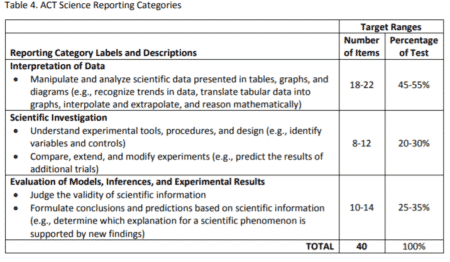
How to Ace the ACT Science Section
The ACT Science section is the fourth section of the SAT, coming after ACT Reading and the optional ACT Essay. The questions on this section aren’t difficult, but you should spend some time preparing. The science content is fairly basic, so you don’t need to have extensive knowledge of geology or astronomy to ace this section. You can also skip the lengthy texts and just focus on analyzing the graphs and charts, and you’ll do fine.
The ACT science section isn’t easy, but it can be the most challenging
For one thing, the science section is designed to test your ability to understand graphs and interpret experiments. Even if you’ve studied biology and chemistry, it can be tricky to apply what you’ve learned in those classes to the ACT. The pacing is incredibly tight, so students need to train their speed and reasoning skills in order to be successful.

The ACT Science section is divided into several sections. The first section involves six or seven passages, followed by a variable number of multiple-choice questions. This section draws from topics in chemistry and biology. There are a few common topics on this section. During the reading portion, you should focus on analyzing data and evaluating scientific information. The questions should also measure your analytical and critical-thinking skills. While reading the passages and answering the corresponding questions, you should focus on analyzing graphs and figures, and try to find as many similarities and differences as possible.
The ACT Science section tests your understanding of scientific processes
The content is not related directly to the topics you learned in high school, but it requires you to use your reading and interpretation skills. If you are confident about your knowledge of biology, you can easily read the ACT passages. The graphics used on the ACT section are based on the knowledge students gained in high school. By practicing the quickest way to find information, you’ll be better equipped to answer the questions on the ACT.
The ACT science section will require you to answer questions involving scientific terminology. For example, a graph will show that a particular compound is related to another. Likewise, a table can show how the two variables are connected. Depending on how much knowledge you have, you might need to consider comparing graphs and figures in two different ways. You can also choose to include a diagram in the question. The ACT science section will contain multiple visuals. These are the charts, graphs, and tables.
ACT Science questions will require you to use your analytical skills to answer questions. The ACT science section has many questions on the effects of light and carbon dioxide. By using your analytical skills, you’ll be able to answer the questions more effectively. However, you will need to learn the ACT-level material that the test requires and what the test’s level of difficulty is. This will ensure that you can score as high as you possibly can.
The ACT science section is not difficult, but it can be frustrating for students
Most ACT science questions involve analyzing graphs and studies. As a result, you’ll need to know how to analyze data and the underlying relationships between variables. If you can’t answer a question, you’ll get a grade that’s below the average. By preparing for the ACT science section, you’ll be able to get a high score.
While ACT science questions aren’t directly related to topics you learned in high school, the ACT’s science section builds on those concepts. This means that you’ll need to be able to interpret data and graphs. If you’re a high school student, a background in biology and earth sciences will help you ace the ACT science section. For example, if you studied the process of photosynthesis in fish, you’ll be able to break down a passage that describes this process.
ACT science tests essentially require students to read 6-7 studies and analyze graphs to answer questions. The exam also involves three different reporting categories: summary, data, and data. It’s best to spend some time studying these sections and practicing with them before the ACT. You’ll also want to prepare for the ACT’s math section, which is easier to score than the section on biology or earth sciences. You can even prepare for it by using the ACT’s practice tests.

Comments (0)